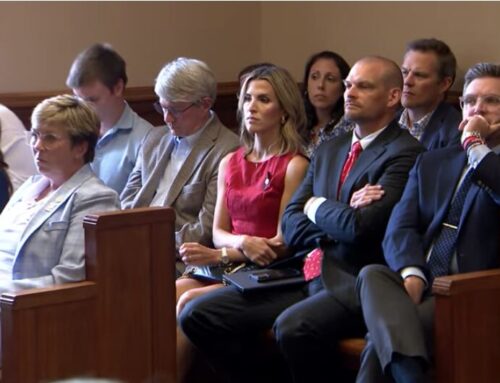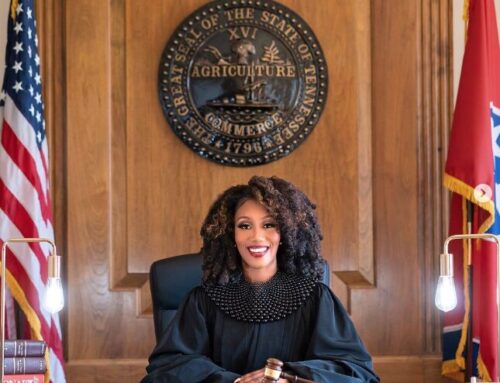Knoxville prepares new blanket ban on releasing dashcam video, waits for TN Supreme Court ruling
The Knoxville Police Department is waiting on a decision by the Tennessee Supreme Court before it puts into place a new blanket ban on release of all dashcam videos, sometimes indefinitely.
In a story today by longtime crime and courts reporter Jaime Satterfield in the Knoxville News Sentinel, Knoxville’s Deputy Law Director Ron Mills says: “You have to protect the integrity of not only your investigation but your prosecution. If there’s a pending appeal or within the possible time frame for a (post-appeal) relief petition, yes, it could be years. In the case of unsolved crimes, it could be indefinite.”
The proposed policy would be a marked change for the Knoxville PD, and no distinctions or explanations would be required for denying access to the public to see any particular video.
Some examples, Mills conceded, could be a traffic stop in which the dashcam happens to capture evidence of some unrelated crime; a claim of police brutality; a death of a suspect in which a police officer is involved; any police footage from any crime in which the possibility of charges exists, even if no suspect has been identified; witness interviews captured on video; and footage from any potential crime scene.
Mills said the police department is waiting for a decision by the Tennessee Supreme Court in the public records case against the Nashville police department involving records from the Vanderbilt rape case. An appellate court held that Criminal Court Rule 16(a)(2) gave law enforcement the right to keep confidential any records “relevant to pending or contemplated criminal action,” essentially, the entire police file. (Supreme Court case will decide public access to police files.)
Still, no one with the police department could cite an example where release of such dashcam video in the past harmed their investigation or prosecution.
Following is an excerpt from the Knoxville News Sentinel’s story, Proposed KPD video policy would bar public from access to footage.
No one will say with clarity exactly what prompted the agency to review its current policy — which allows the release of videos as long as prosecutors have not asked for an investigative hold. KPD spokesman Darrell DeBusk said police sought the review.
“After recent high-profile cases from across the state and as part of our normal review of policies and procedures, there appeared to be a potential issue with the premature release of videos that may be of evidentiary value,” DeBusk wrote in an email in response to a News Sentinel query. “We approached the DA (Knox County District Attorney General Charme Allen’s office), and they agreed.”
A spokesman for Allen has not responded to requests for comment on her role or to questions about whether she supports a blanket ban and why. Eric Vreeland, spokesman for Knoxville Mayor Madeline Rogero, said the mayor was unaware of the proposed change “until you asked about it, and she will be discussing it with (Police) Chief (David) Rausch.”
Mills said he, too, was not clear on what prompted the proposed policy change.
“I’m not sure what the genesis was,” he said, adding the topic was first raised with the city law department in June.
Pressed to cite specific “high-profile cases from across the state,” DeBusk wrote, “There have been several cases throughout the state, but the one that stands out the most is the Vanderbilt rape case.”
The Tennessean newspaper requested police records involving former Vanderbilt football players charged in the 2013 rape of a fellow student in a campus dormitory. Metro Nashville police denied the request and the newspaper sued, along with other news media organizations, including the Associated Press.
Government attorneys in that case contend a rule that applies to the release of information to defense attorneys in criminal cases also provides an exemption to the Tennessee Open Records Act on the public’s access to police records. The state Supreme Court is expected to rule in the coming months.
The case has been on the radar of Tennessee Coalition for Open Government Executive Director Deborah Fisher because, she says, a ruling favorable to the government would lend legal authority to a growing practice among police agencies statewide to shroud the conduct of police agencies in secrecy.
“We do not need a secret police system in communities across Tennessee,” she said.
Fisher found the KPD’s proposed policy change on the release of videos particularly troubling, since it would make police the gatekeepers.
“The problem is that by allowing the police to basically have unlimited power to keep whatever secret they want, it opens the door for all kinds of abuse,” she said. “Not every police chief or sheriff is going to abuse the system, but you can imagine the abuses that could occur, and no one could find out about it.”
She also faulted the KPD for not including the community it polices in the policy discussions, as well as for excluding input from media organizations that represent the public.
Knox County Public Defender Mark Stephens said the defense bar also was not consulted and learned of the proposed policy change only when staffers in his office were suddenly denied videos in routine cases, such as DUI prosecutions. He said Allen has since proposed a special process for defense access in which her office becomes the gatekeeper.
Defense attorneys can go to a judge or garner a subpoena if necessary, noted attorney Stephen Ross Johnson. As head of the University of Tennessee law school’s wrongful conviction team, Johnson has battled before to glean records in older cases. He said the policy change in the release of KPD videos is not as detrimental to the defense bar as it is to the public.
“We have other mechanisms,” he said. “The public does not (if a blanket exemption is approved by the high court).”
Fisher said the KPD’s proposed blanket ban is hypocritical in that the agency, as do all police departments, has and will continue to release videos that officials want the public to see, such as robbery surveillance video of a suspect or video clearing an officer of an allegation of wrongdoing.
“You shouldn’t be able to have it both ways,” Fisher said.
Fisher said she finds the proposed blanket ban particularly troubling in the wake of a series of deaths of suspects at the hands of police across the nation. Police nationwide are promising more transparency, not less, she noted.
“When they withhold videos of an incident, it sometimes creates more suspicion in the community on why they are trying to keep that secret,” she said. “I hope this debate on police records will raise awareness of what is happening in Tennessee in regard to the release of basic police records that let the community know what’s going on in their cities.”
Not only would such a policy deepen mistrust between police and the communities they serve, but, Fisher argued, it also could hurt efforts to restore trust. The videos, for example, show residents what officers face and can invite public help in tackling tough neighborhood issues such as drug use and gang violence.
“Video of police activities is very powerful,” she said. “It gives us insight into police action and reaction.”
Fisher suggested the KPD at least establish an independent judge of what is legitimately necessary to withhold from the public and what is not. Mills, the deputy law director, countered it would be tough to decide just who would count as a neutral party, creating a potential bureaucratic quagmire.
“The problem is, who is independent in this process?” Mills said.
For now, the policy remains unchanged. Mills said discussions continue, and he wants to see a decision rendered in the Vanderbilt case before a final change is made.
“The Vanderbilt case has the potential to reaffirm (the proposed policy) or change all of it,” he said.




